Filter by

New Economic Engine: Effective Government and Efficient Market
This book contains at least three main highlights: breaking through the limitations of the mainstream Western economics system and the market theory framework, correctly explaining the successful experience of China’s reform and opening up over the past 40 years from an economic perspective, and developing a new economics system and market theory. China’s reform and opening up and innovativ…
- Edition
- 1
- ISBN/ISSN
- 978-981-15-2922-1
- Collation
- Economic
- Series Title
- -
- Call Number
- 338.1
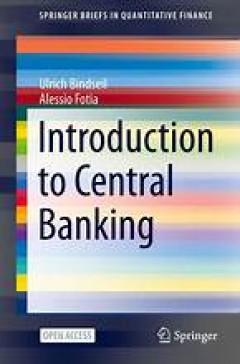
Introduction to Central Banking
This open access book gives a concise introduction to the practical implementation of monetary policy by modern central banks. It describes the conventional instruments used in advanced economies and the unconventional instruments that have been widely adopted since the financial crisis of 2007–2008. Illuminating the role of central banks in ensuring financial stability and as last resort len…
- Edition
- 1
- ISBN/ISSN
- 978-3-030-70884-9
- Collation
- Banking
- Series Title
- SpringerBriefs in Quantitative Finance
- Call Number
- 332
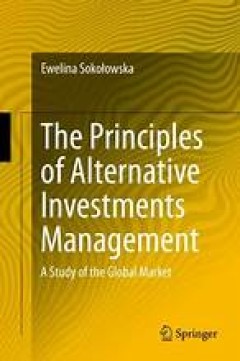
The Principles of Alternative Investments Management
The purpose of this book is to present the principles of alternative investments in management. The individual chapters provide a detailed analysis of various classes of alternative investments on the financial market. Despite many different definitions of alternative investments, it can be assumed that a classical approach to alternative investments includes hedge funds, fund of funds (FOF), m…
- Edition
- 1
- ISBN/ISSN
- 978-3-319-13215-0
- Collation
- Manajemen
- Series Title
- -
- Call Number
- 658
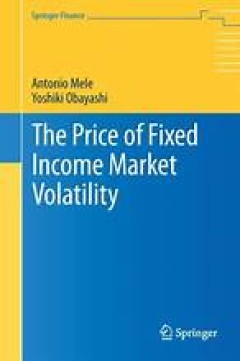
The Price of Fixed Income Market Volatility
Fixed income volatility and equity volatility evolve heterogeneously over time, co-moving disproportionately during periods of global imbalances and each reacting to events of different nature. While the methodology for options-based "model-free" pricing of equity volatility has been known for some time, little is known about analogous methodologies for pricing various fixed income volatilities…
- Edition
- 1
- ISBN/ISSN
- 978-3-319-26523-0
- Collation
- Manajemen
- Series Title
- Springer Finance
- Call Number
- 658
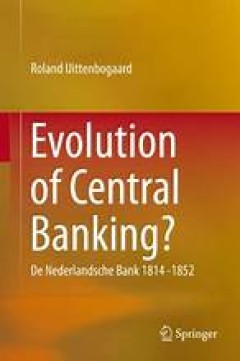
Evolution of Central Banking?
The book analyses the establishment of De Nederlandsche Bank and its early development as a case study to test competing theories on the historical development of central banking. It is shown that the establishment of DNB can be explained by both the fiscal theory and the financial stability theory. Later development makes clear that the financial stability role of DNB prevailed. DNB´s bank no…
- Edition
- 1
- ISBN/ISSN
- 978-3-319-10617-5
- Collation
- -
- Series Title
- XV, 170 14 illustrations in colour ,
- Call Number
- -
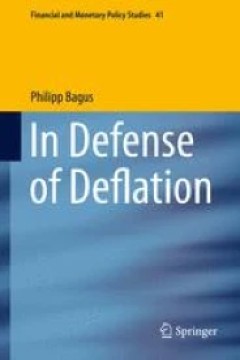
In Defense of Deflation
This book analyses the causes and consequences of deflation. In contrast to the widespread belief that deflation would be harmful to the economy as a whole, the author argues that free market deflation is liberating and beneficial. Several myths of deflation are exposed and the reasons for the widespread deflation phobia that serves to justify expansionary monetary policy, i.e., inflation are i…
- Edition
- -
- ISBN/ISSN
- 978-3-319-13427-7
- Collation
- XVII, 215
- Series Title
- -
- Call Number
- 330 BAG i
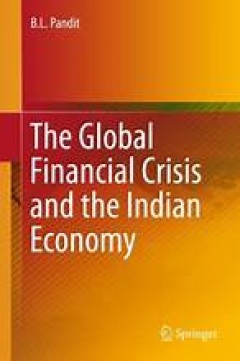
The Global Financial Crisis and the Indian Economy
After tracing the causes of the global financial crisis, the book focuses on two fundamental systemic issues connected with its manifestation: financial-sector regulation and the problem of the dollar-centric international monetary system, both of which have been widely cited among the important factors leading to the 2008 financial crisis. The important analytical question of monetary policy t…
- Edition
- 1
- ISBN/ISSN
- 978-81-322-2395-5
- Collation
- XI, 142, 31 b/w illustrations
- Series Title
- -
- Call Number
- -
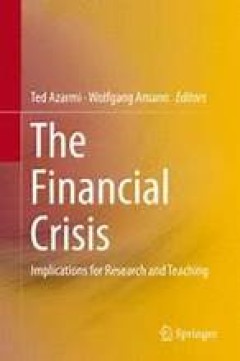
The Financial Crisis
This book brings together a good mix of academics and practitioners for a discussion that focuses on how to change financial practice and the academic field of finance in order to understand the current financial crisis and deal with future turbulent financial times. The volume is based on contributions by prominent academics and practitioners from Europe, Asia and the USA. The book contains se…
- Edition
- 1
- ISBN/ISSN
- 978-3-319-20588-5
- Collation
- XI, 175, 3 b/w illustrations, 22 illustrations in colour
- Series Title
- -
- Call Number
- -

The Principles of Alternative Investments Management
The purpose of this book is to present the principles of alternative investments in management. The individual chapters provide a detailed analysis of various classes of alternative investments on the financial market. Despite many different definitions of alternative investments, it can be assumed that a classical approach to alternative investments includes hedge funds, fund of funds (FOF), m…
- Edition
- 1
- ISBN/ISSN
- 978-3-319-13215-0
- Collation
- XI, 186, 38 b/w illustrations, 4 illustrations in colour
- Series Title
- -
- Call Number
- -

Applied Investment Theory: How Markets and Investors Behave, and Why
Institutions now dominate trading in equities around the world. Mutual funds are the most prominent, and doubly important as custodians of retirement savings. Despite this, there is no comprehensive description of fund manager behaviour, much less a matching theory. This is troubling because one of the most economically significant puzzles in finance is why experienced, well-resourced fund mana…
- Edition
- Ed. 1
- ISBN/ISSN
- 978-3-319-43976-1
- Collation
- XXV, 246
- Series Title
- -
- Call Number
- 339 COL a
 Computer Science, Information & General Works
Computer Science, Information & General Works  Philosophy & Psychology
Philosophy & Psychology  Religion
Religion  Social Sciences
Social Sciences  Language
Language  Pure Science
Pure Science  Applied Sciences
Applied Sciences  Art & Recreation
Art & Recreation  Literature
Literature  History & Geography
History & Geography